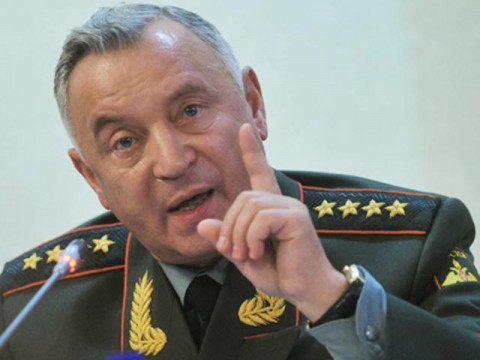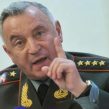
Spending Cuts and Tax Increases Pending After the Presidential Election
Publication: Eurasia Daily Monitor Volume: 9 Issue: 33
By:

The First Deputy Defense Minister and Chief of the General Staff of the Armed Forces, Army-General Nikolai Makarov, during a press conference this week lambasted the Russian defense industry, which is producing expensive, but low quality armament inferior to Western products. Makarov declared the Russian military has successfully reformed itself since 2008, and now the main stumbling block is rearmament. The defense industry has failed to produce modern unmanned aerial vehicles (UAVs), tanks and armored combat vehicles (ACVs). Makarov lamented that the defense ministry has spent “tens of billions of rubles” ($1=30 rubles) on UAV research and development (R&D), “but we still do not have any UAVs,” and the money “could have been misappropriated” (RIA Novosti, February 14).
Makarov announced that the defense ministry will not be procuring new tanks or ACVs in the coming five years to give the Russian industry time to develop more modern weapons. “We have a serious situation with the army [Sukhoputniye Voyska],” announced Makarov, “We more or less stopped procuring any new weapons, firearms or armor, because not a single item suits us.” Makarov believes that traditionally the Russian defense industry was concerned about increasing firepower and the speed of ACVs, while “disregarding the protection of crews.” Makarov complained that “any small mine kills all the crew” of a Russian ACV, while the new T-90 tank is just a modernization of the old T-72 tank. Instead of procuring new armor, the defense ministry has decided to save money by modernizing weapons already in their arsenal (Interfax, February 14).
The flamboyant nationalist politician Dmitry Rogozin, who was appointed as deputy prime minister last December by President Dmitry Medvedev to oversee the defense industry, immediately publicly reprimanded the general by using Twitter: “If the Chief of the General Staff has problems with the quality of Russian weaponry, he must speak at closed meetings with defense industry officials and not publicly at press conferences.” Rogozin added, “In NATO such actions are unthinkable” (Interfax, February 14). Rogozin, previously an opposition nationalist politician became Russia’s permanent representative to NATO in Brussels in December 2007. After being appointed as deputy prime minister, Rogozin has been constantly meeting the press, running a micro blog on Twitter and providing a stream of quotes about how he is going to fight corruption and waste in defense procurement and help the defense industry to mass produce wonderful new weapons to turn Russia once again into a great military superpower (EDM, January 19).
Makarov did not heed Rogozin’s reprimand. On February 15, Makarov gave a long interview to the liberal Ekho Moskvy, stressing that Russia has a low birth rate and not enough young men to run a Soviet-style mass mobilization armed force; that new weapons and armaments must be on a par with Western ones and help save the lives of soldiers in battle. Makarov conceded he may have been misquoted and did not plan to starve the Russian defense industry and in particular tank production by fully withholding funds. The industry will be given finance to run R&D to develop better weapons and will be awarded lucrative contracts to mass modernize existing tanks (Ekho Moskvy, February 15).
In another public clash with Rogozin, Makarov complained that the United Shipbuilding Corporation is dragging its feet, by not fully completing on time the first two Borey-class nuclear strategic submarines, Yuri Dolgoruky and Alexander Nevsky, armed with the Bulava-30 ballistic missile and has not delivered documents stipulating the exact cost of making the submarines. The Severodvinsk – the first highly expensive nuclear attack submarine of the new Yasen-class – is also still undelivered to the navy. Makarov confirmed that existing plans are to procure eight Borey-class strategic submarines and eight Yasen-cless attack submarines by 2020. According to Makarov, Rogozin’s claim that the two additional Borey-class and two Yasen-class submarines will be procured before 2020, were “Rogozin’s personal initiative” (Nezavisimaya Gazeta, February 15).
The Russian defense industry has been rallying behind Rogozin, eager to secure a windfall of lucrative procurement contracts. The defense ministry is resisting Rogozin’s attempts to take over procurement. Colossal amounts of money and real power are involved with an estimated 23 trillion rubles ($767 billion) earmarked for procurement and state investments to modernize Russia’s defense industry until 2020 (Izvestiya, February 14). Unnamed “government-connected” sources are quoted, claiming that by summer, when a fresh government is formed after the inauguration of a new president (presumably Vladimir Putin, who is running for a third term on March 4), procurement and R&D decision-making will be taken away from the defense ministry and General Staff and a new agency will be created within the government, presumably controlled by Rogozin (Izvestiya, February 15).
In fact, nothing has been finally decided. Rogozin is determined to create a personal powerbase by becoming a champion of the defense industry and at the same time building a loyal following within the armed services by controlling their procurement. Rogozin’s constant use of the Internet and Twitter seem to have won him favors with Internet-savvy Medvedev, but after his planned re-election Putin may decide that giving too much sway in defense and security matters to an ambitious, unpredictable nationalist politician is overly risky.
Another and potentially more serious defense-related in-fight is raging within the government. The finance ministry is insisting that the vast increases in defense, law enforcement and security service spending do not allow it to balance the budget at the present level of taxation. The finance ministry is reported to have proposed to either cut substantially defense and security spending plans, or to drastically increase taxes and cut social and pension payouts. A substantial increase in VAT, income tax, payroll social security taxation and massive alcohol and tobacco price increases have been proposed. A plan to introduce payroll social security taxation of military personnel has been proposed (Vedomosti, February 14, 15, 16). Putin has placed himself in a fix by offering simultaneous social security and defense and security spending increases. Unpopular spending and taxation reforms after the presidential election, will increase social and political tension, while further splitting the ruling elite.




